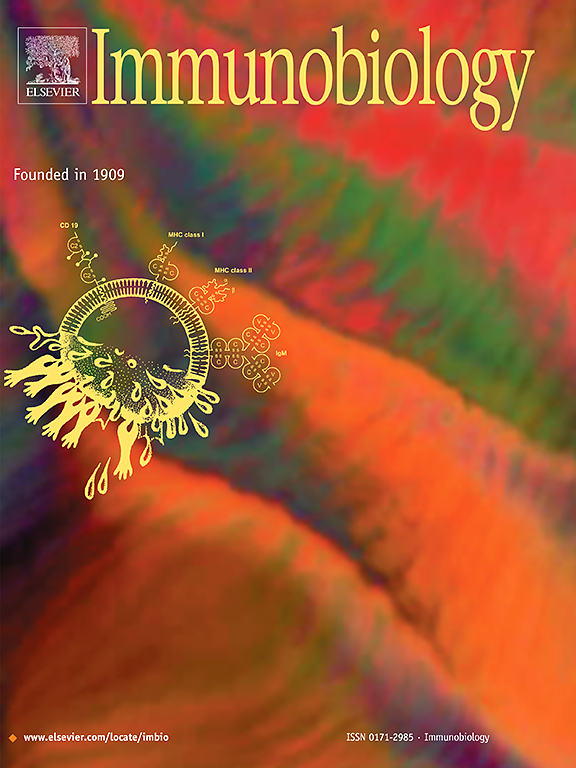Associations of HLA-G 3’UTR polymorphisms and increased HLA-G expression with gastric cancer susceptibility and prognosis
IF 2.3
4区 医学
Q3 IMMUNOLOGY
引用次数: 0
Abstract
Background
Gastric cancer (GC) remains a serious health concern and is characterized by a multifactorial etiology involving both genetic and epigenetic factors. The aim of the current study was to examine the relationship between Human leukocyte antigen (HLA)-G 3’UTR polymorphisms and the expression of HLA-G in both tumor tissues and plasma samples from patients with GC in the Tunisian population.
Methods
HLA-G 3’UTR polymorphisms (14pb Insertion/deletion and + 3142C/G) were identified by polymerase chain reaction (PCR) or Sanger sequencing. Plasma levels of sHLA-G (total sHLA-G, shed HLA-G1 and HLA-G5) were determined. Immunohistochemistry was used to evaluate the expression of HLA-G in tumor tissues.
Results
The Del/Del genotype and Del allele frequencies were different between GC patients and healthy donors (HD) (OR [95 % CI] = 2.483 [1.070–5.410], p = 0.025 vs. OR [95 % CI] = 1.537 [0.924–2.584], p = 0.099; respectively). The C/C genotype and C allele frequencies were significantly greater in GC patients than in HD (OR [95 % CI] = 2.269[0.1.070–4.904], p = 0.033 vs. OR [95 % CI] = 1.746[1.045–2.878], p = 0.034; respectively). Interestingly, the Del/Del genotype and Del allele were significantly associated with an increased risk of GC in patients aged ≥55 years at diagnosis. HLA-G was highly expressed in GC tissues, particularly in tissues with advanced tumor invasion (T3 + T4). Compared with HD, GC patients had higher soluble HLA-G, shed HLA-G1 and HLA-G5 levels (Mann-Whitney: p = 0.001, p = 0.001 and p = 0.643, respectively). Assessment of patients' survival by Kaplan-Meier analysis indicated that the Del allele was significantly associated with reduced overall survival (OS) in GC patients at advanced stages III + IV (p = 0.043).
Conclusions
These results suggest that HLA-G 3’UTR polymorphisms are associated with GC susceptibility in Tunisian population. The expression of HLA-G in both the tissue and plasma may play an important role in the development and progression of GC. Therefore, the current study supported the recommendation of investigating HLA-G 3’UTR polymorphisms in GC and indicated that HLA-G molecules could serve as promising therapeutic targets in GC.
HLA-G 3'UTR多态性和HLA-G表达增加与胃癌易感性和预后的关系
背景:胃癌(GC)仍然是一个严重的健康问题,其特点是涉及遗传和表观遗传因素的多因素病因。当前研究的目的是检查突尼斯人群中胃癌患者肿瘤组织和血浆样本中人类白细胞抗原(HLA)-G 3'UTR多态性与HLA-G表达之间的关系。方法:采用聚合酶链反应(PCR)或Sanger测序方法鉴定HLA-G 3'UTR多态性(14pb插入/缺失和+ 3142C/G)。测定血浆sHLA-G水平(总sHLA-G、脱落HLA-G1和HLA-G5)。免疫组化法检测肿瘤组织中HLA-G的表达。结果:GC患者与健康供者(HD)的Del/Del基因型及Del等位基因频率差异有统计学意义(OR [95% CI] = 2.483 [1.070 ~ 5.410], p = 0.025 vs. OR [95% CI] = 1.537 [0.924 ~ 2.584], p = 0.099;分别)。GC患者C/C基因型和C等位基因频率显著高于HD患者(OR [95% CI] = 2.269[0.1.070-4.904], p = 0.033 vs. OR [95% CI] = 1.746[1.045-2.878], p = 0.034;分别)。有趣的是,在诊断时年龄≥55岁的患者中,Del/Del基因型和Del等位基因与GC风险增加显著相关。HLA-G在胃癌组织中高表达,特别是在晚期肿瘤侵袭组织(T3 + T4)中。与HD患者相比,GC患者可溶性HLA-G、脱落HLA-G1和脱落HLA-G5水平较高(Mann-Whitney: p = 0.001、p = 0.001和p = 0.643)。Kaplan-Meier分析患者生存评估显示,Del等位基因与晚期III + IV期GC患者总生存(OS)降低显著相关(p = 0.043)。结论:这些结果表明hla - g3 ' utr多态性与突尼斯人群的GC易感性相关。HLA-G在组织和血浆中的表达可能在GC的发生发展中起重要作用。因此,本研究支持研究HLA-G 3'UTR在胃癌中的多态性的建议,并提示HLA-G分子可能成为胃癌的有希望的治疗靶点。
本文章由计算机程序翻译,如有差异,请以英文原文为准。
求助全文
约1分钟内获得全文
求助全文
来源期刊

Immunobiology
医学-免疫学
CiteScore
5.00
自引率
3.60%
发文量
108
审稿时长
55 days
期刊介绍:
Immunobiology is a peer-reviewed journal that publishes highly innovative research approaches for a wide range of immunological subjects, including
• Innate Immunity,
• Adaptive Immunity,
• Complement Biology,
• Macrophage and Dendritic Cell Biology,
• Parasite Immunology,
• Tumour Immunology,
• Clinical Immunology,
• Immunogenetics,
• Immunotherapy and
• Immunopathology of infectious, allergic and autoimmune disease.
 求助内容:
求助内容: 应助结果提醒方式:
应助结果提醒方式:


